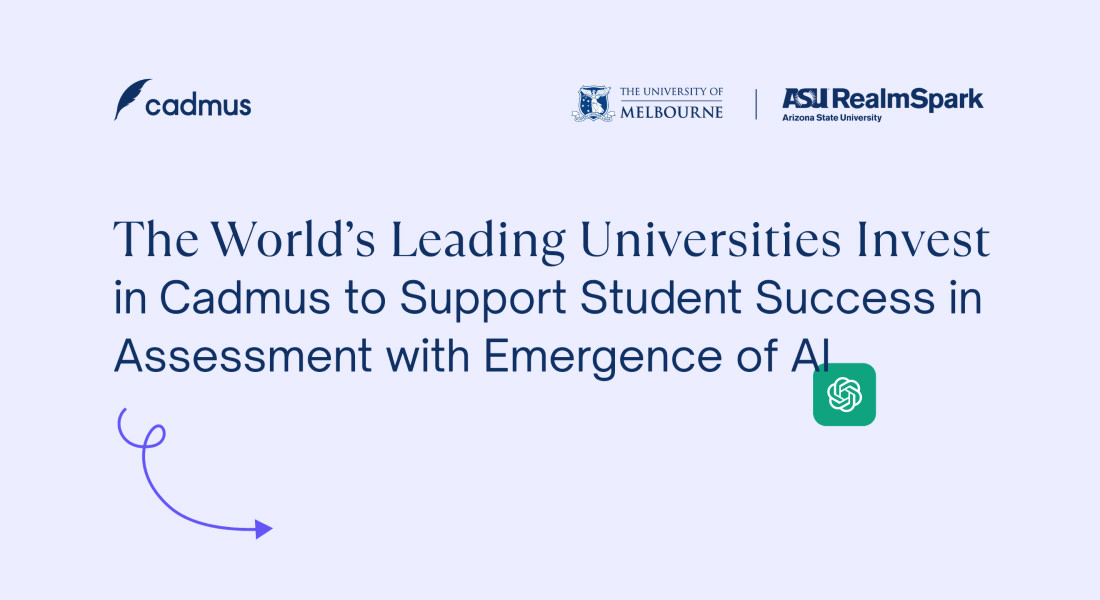The cost of a flawed approach to academic integrity

The 2019 TEQSA Conference again identified academic integrity and contract-cheating as top priorities for the university sector. The discussion prompted reflection on the role of institutions, teachers, students, regulatory bodies and external service providers in addressing these issues. It encouraged consideration of potential solutions, their impact, and the changes necessary for progress across the sector. The question it left us asking, however, is this:
Is the best approach to academic integrity one of policing and prosecution, or education and prevention?
TEQSA chief Anthony McClaran described the agency’s strategy as one focussed on “support, intelligence and the spreading of good practice” — one we believe aligns with our philosophy at Cadmus. We believe a holistic approach, one that puts education and learning at the heart of the problem, is the best way forward.
What are the implications of academic misconduct?
Let’s consider some of the problems experienced by the three main groups involved in academic integrity cases: universities, teachers and students.
Universities
Serious cases of academic integrity affect an institution's reputation. Failing to mitigate misconduct issues risk an institution's perception, graduate quality, and accreditation.
Teachers
The burden on academics forced to investigate academic misconduct cases is significant. The added strain on an already full workload inhibits educators from pursuing activities arguably more valuable, like improving teaching practices or spending time on research.
Students
Students that get away with academic misconduct often fail to achieve their graduate outcomes, directly affecting their employability and the value of their degree.
What happens when we focus on prosecution?
Research shows that students most at risk of cheating are those who:
Speak a language other than English at home;
Feel dissatisfied with the teaching and learning environment; and
Perceive that "there are lots of opportunities to cheat".
There is a consistent theme of a lack of support for students that underpins these factors. A lack of support is often a result of poor relationships between students, teachers, and university services alike.
When institutions take a prosecutorial approach, actioned through their teaching staff, the motivations of the university are promoted above the needs of teachers and students. This has far-reaching implications on the relationships and culture within a university; not to mention misalignment in a sector striving to promote partnerships and student success. It disregards student voices, who repeatedly tell universities “don’t treat all students as potential cheaters”.
The cost of policing initiatives on teachers, students and university culture often does not warrant the perceived benefits of ‘catching cheaters’. Teaching and learning improvements become secondary, although support for these strategies is well observed. Finally, engaging in an unwinnable arms-race against the essay-mills industry, only compounds and exacerbates the shift in resources away from teaching, and towards policing.
What do we believe is the best approach?
At Cadmus, we support a multi-factored approach to decreasing academic misconduct — one that strives for education and prevention, while providing actionable insights for potential breaches of academic integrity. It frames the issue in a positive light, setting the tone for progress across the sector and equality amongst the groups involved. We’ve embedded this philosophy into our product, creating a solution that understands the needs of universities, teachers and students. Cadmus strives to:
Improve student learning (developing graduate outcomes)
Prevent cases of misconduct (decreasing teacher workload)
Provide actionable insights into misconduct cases (giving universities the necessary assurances)
We’ve seen the value in taking an educative approach to academic integrity, and our users have too. They’ve experienced reductions in plagiarism cases, better student engagement, and decreased workloads. If we continue to work collectively, focussing our efforts on student support and learning, we can avoid the consequences of academic integrity initiatives espoused by policing and prosecution.

Keep learning…
The latest in teaching and learning. Delivered to your inbox.



